Last updated: 22.09.2025
What Are Economic Sanctions?
Economic sanctions, also referred to as restrictive measures, are legal and political tools used by states or international organizations such as the European Union (EU) or the United Nations (UN). They are imposed on individuals, entities, or entire states whose actions breach international law or pose threats to global peace and security.
Sanctions programs may include restrictions such as:
- Entry bans on certain individuals,
- Asset freezes within sanctioning jurisdictions
- Trade restrictions such as prohibiting the export of specific goods,
- Suspension of cooperation in targeted areas of business or politics.
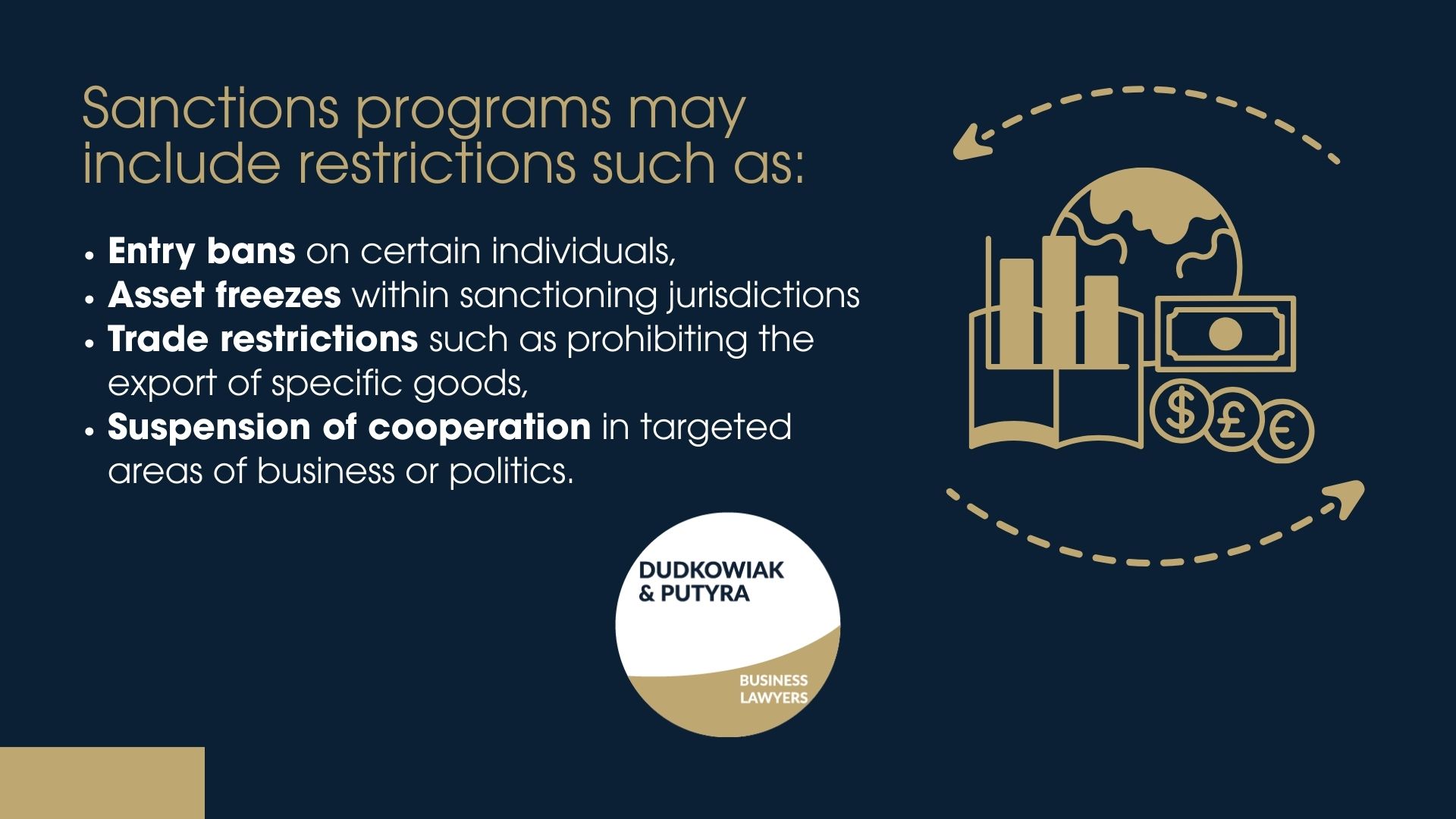
These measures can apply to new business relations or, in some cases, even require the termination of existing agreements. The global sanctions framework is dynamic and constantly evolving.
Sanctions Compliance in Poland
As a member of both the UN and the EU, Poland is obligated to implement and enforce both UN and EU sanctions. Furthermore, since April 2022, Poland has introduced its own national sanctions regulations (Polish Sanctions Act) that complements international restrictions.
This guide explains:
- Which sanctions must be observed by entities operating in Poland,
- How to establish an effective sanctions compliance system,
- The impact of sanctions on trade agreements and business operations.
United Nations Sanctions
Within the UN system, the Security Council (SC) is the primary body responsible for imposing sanctions. Under Chapter VII of the UN Charter, if the Council identifies a threat to peace, breach of peace, or act of aggression, it may adopt resolutions introducing non-military measures such as sanctions.
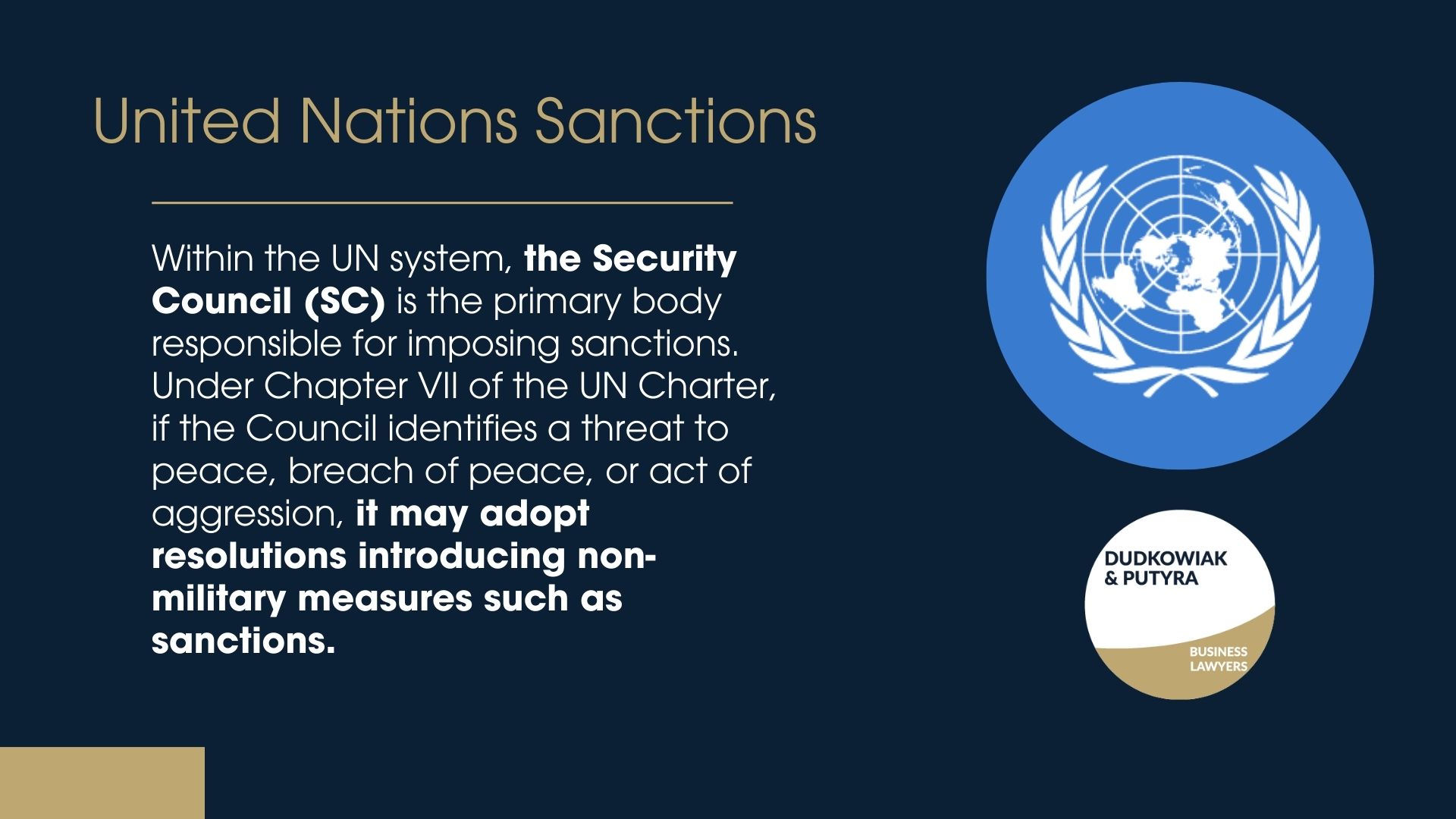
All UN Member States are obligated to implement these restrictions within their jurisdictions.
European Union Restrictive Measures
The EU enforces both:
- UN sanctions, adopted into EU regulations, and
- Autonomous EU restrictive measures, established under the Common Foreign and Security Policy (CFSP).
How EU Sanctions Are Adopted
- Arms embargoes and travel bans are implemented directly by Member States following Council decisions under Article 29 of the Treaty on European Union (TEU).
- Measures that affect the economy and trade relations (e.g., asset freezes, restrictions on financial flows) are enforced through Council Regulations under Article 215 of the Treaty on the Functioning of the European Union (TFEU).
These sanctions legislation instruments form the legal foundation for the EU sanctions regulations and are binding across all EU Member States, including Poland
The Polish Sanctions Act of 2022
On 16 April 2022, Poland introduced the Act of 13 April 2022 on specific measures to counteract the support of aggression against Ukraine and to protect national security (Polish Sanctions Act).
This law serves two purposes:
- Implements and establishes procedures at national level to enforce EU sanctions regulations targeting Russia and Belarus,
- Establishes Poland’s own autonomous sanctions regime, as part of its national security and foreign policy instruments.
Key Features of the Polish Sanctions Act
- National List of Sanctioned Persons and Entities: Includes individuals or organizations directly or indirectly supporting Russian aggression or human rights violations in Russia and Belarus.
- Restrictive Measures:
- Freezing of assets and economic resources,
- Exclusion from public procurement and tenders,
- Ban on entry and residence in Poland,
- Prohibition of coal imports and transit from Russia and Belarus.
- Listing Procedure: Decisions are made by the Minister of Internal Affairs and published in the Public Information Bulletin.
Who Must Comply With EU and Polish Sanctions?
Both public authorities and private entities are responsible for ensuring compliance with sanctions.
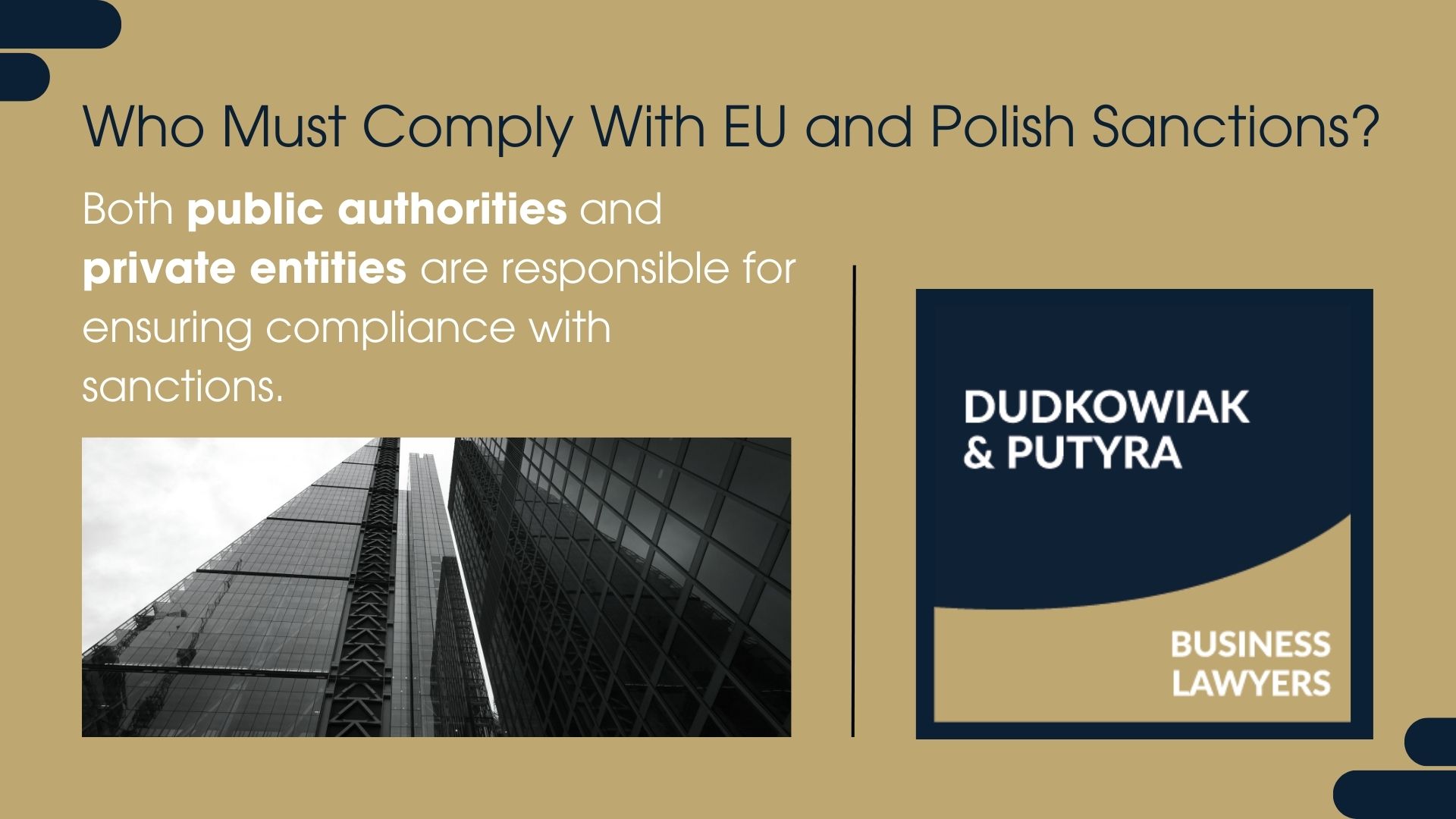
Public Authorities
Some sanctions, such as entry bans, can only be enforced by state bodies (e.g., border guards).
Private Actors
Businesses and individuals must comply with restrictive measures. EU sanctions are binding on:
-
- Any person located within the EU (including airspace, vessels, and aircraft registered in EU Member States),
- EU citizens, regardless of their location,
- Companies and organizations registered under the laws of EU Member States,
- Any entity conducting business activities within EU territory.
Types of Sanctions and Their Scope
Sanctions can apply to a wide range of entities, individuals, sectors, and states. Their aim is to restrict access to resources, financing, or markets, and they can be comprehensive or narrowly targeted.
Below is an overview of the main categories of sanctions and their possible measures under applicable sanctions legislation and related legislation.
Sanctions Targeting Individuals
Personal sanctions focus on specific persons or groups and are designed to limit their ability to travel, access funds, or conduct business. Common measures include:
- Asset freezes – blocking access to bank accounts and property,
- Prohibition on providing funds or resources – directly or indirectly,
- Ban on commercial transactions – preventing business relationships,
- Visa restrictions and travel bans – prohibiting entry into sanctioning countries.
Sanctions Against Companies and Organizations
Enterprises, institutions, and other entities (including terrorist groups) may also be sanctioned. Typical restrictions include:
- Freezing of financial and economic resources,
- Bans on trade, services, or cooperation in sensitive areas,
- Limitations on business partnerships and investments.
Sectoral Sanctions: Restrictions by Industry
Sometimes sanctions target entire industries within a country. These sectoral sanctions may apply to:
- Energy and natural resources – petroleum, gas, and precious metals,
- Dual-use goods – items with both civilian and military applications, subject to export controls under EU and national regulations,
- Raw materials – timber, tobacco-related products, or other key exports
- Luxury goods – high-end luxury products such as jewels, clothes, watches, accessories, and products for domestic use,
- Financial sector – bans on transactions with important banks and financing institutions, investment, crypto-assets,
- Services – accounting, auditing, bookkeeping, tax consulting, non-essential legal services, IT consultancy and other key services.
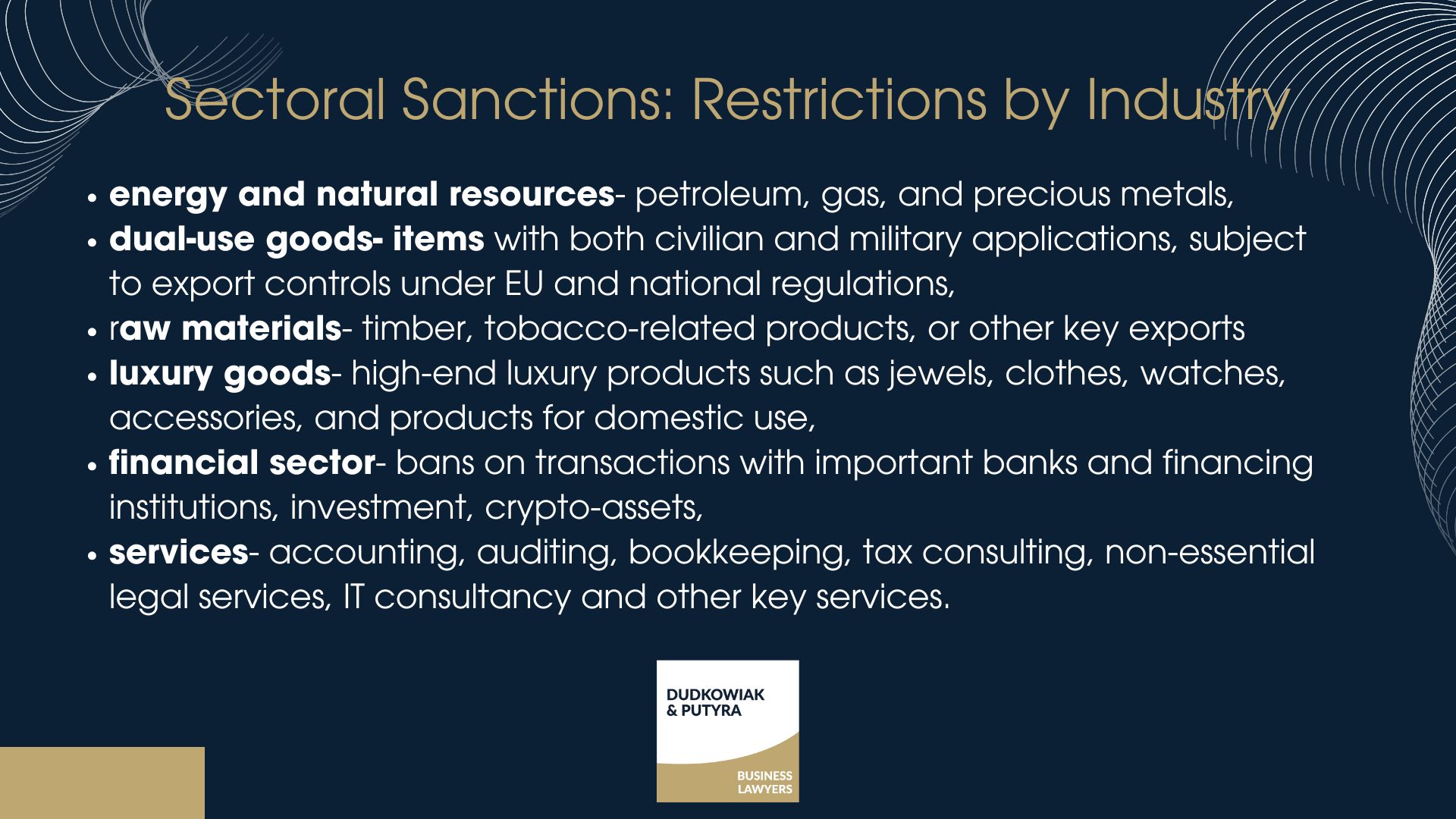
Such measures aim to disrupt economic activity in strategic sectors of the targeted state.
Subject Sanctions: Trade and Investment Restrictions
Subject sanctions typically focus on specific activities or goods. They can include:
- Export or import bans – applied to particular restricted goods such as arms, oil, timber, or diamonds,
- Investment and payment prohibitions – preventing capital flows to or from a sanctioned country,
- Withdrawal of tariff preferences,
- Transport restrictions, such as flight bans, sometimes requiring a customs declaration or a document confirming the final destination of goods.
Comprehensive State Sanctions
In certain cases, sanctions apply broadly to an entire state, covering nearly all forms of trade and cooperation. These comprehensive regimes significantly restrict foreign affairs, diplomatic, economic, and financial relations.
Financial Sanctions: Limiting Access to Capital
Financial sanctions aim to restrict a sanctioned party’s ability to raise or move funds. These may involve:
- Bans on financing and financial services,
- Restrictions on access to loans or investment capital,
- Prohibition on brokerage, technical, or advisory services.
Penalties for Non-Compliance with Sanctions in Poland
EU Framework and Penalties for Non-Compliance with Sanctions
As part of its ongoing effort to strengthen the enforcement of restrictive measures, the EU has recently introduced a uniform legal framework to combat circumventing sanctions more effectively.
Harmonizing Criminal Liability: Directive (EU) 2024/1226
Adopted on 24 April 2024, Directive (EU) 2024/1226 – also known as the EU Sanctions Directive – standardizes how sanctions breaches are criminalized across all Member States. This Directive mandates:
- Criminalization of Sanctions Violations: Intentional breaches – such as failing to freeze assets, violating trade embargoes, or providing prohibited services – must be criminal offences. In high-risk areas (e.g., military or dual-use goods), serious negligence may also trigger liability.
- Penalties for Individuals: Member States must impose effective, proportionate, and dissuasive penalties. Depending on the gravity, offenders may face imprisonment of up to 5 years, with certain breaches (e.g., involving goods worth EUR 100,000 or dual-use items) mandating sentences of at least 5 years.
- Corporate Liability and Fines: Corporate entities can be held liable if violations are committed by persons in leading positions. Fines must be substantial – calculated as 1–5% of worldwide annual turnover, or fixed amounts of EUR 8 million to EUR 40 million, depending on the offence.
- Asset Confiscation: The Directive introduces enhanced freezing and confiscation mechanisms for proceeds and instrumentalities of sanctions violations, especially in circumvention cases.
- Aggravating and Mitigating Circumstances: Member States must take into account aggravating factors (e.g., organized crime involvement) and recognize mitigating factors (such as cooperation with authorities) when determining penalties.
- Statute of Limitations: For serious offences, the minimum limitation period is 5 years, though it may be reduced to 3 years under certain conditions.
Transposition Deadlines and Current Status
Member States were required to transpose this Directive into national law by 20 May 2025. However, as of early August 2025, 18 Member States have not yet fully implemented it, prompting the European Commission to initiate infringement proceedings.
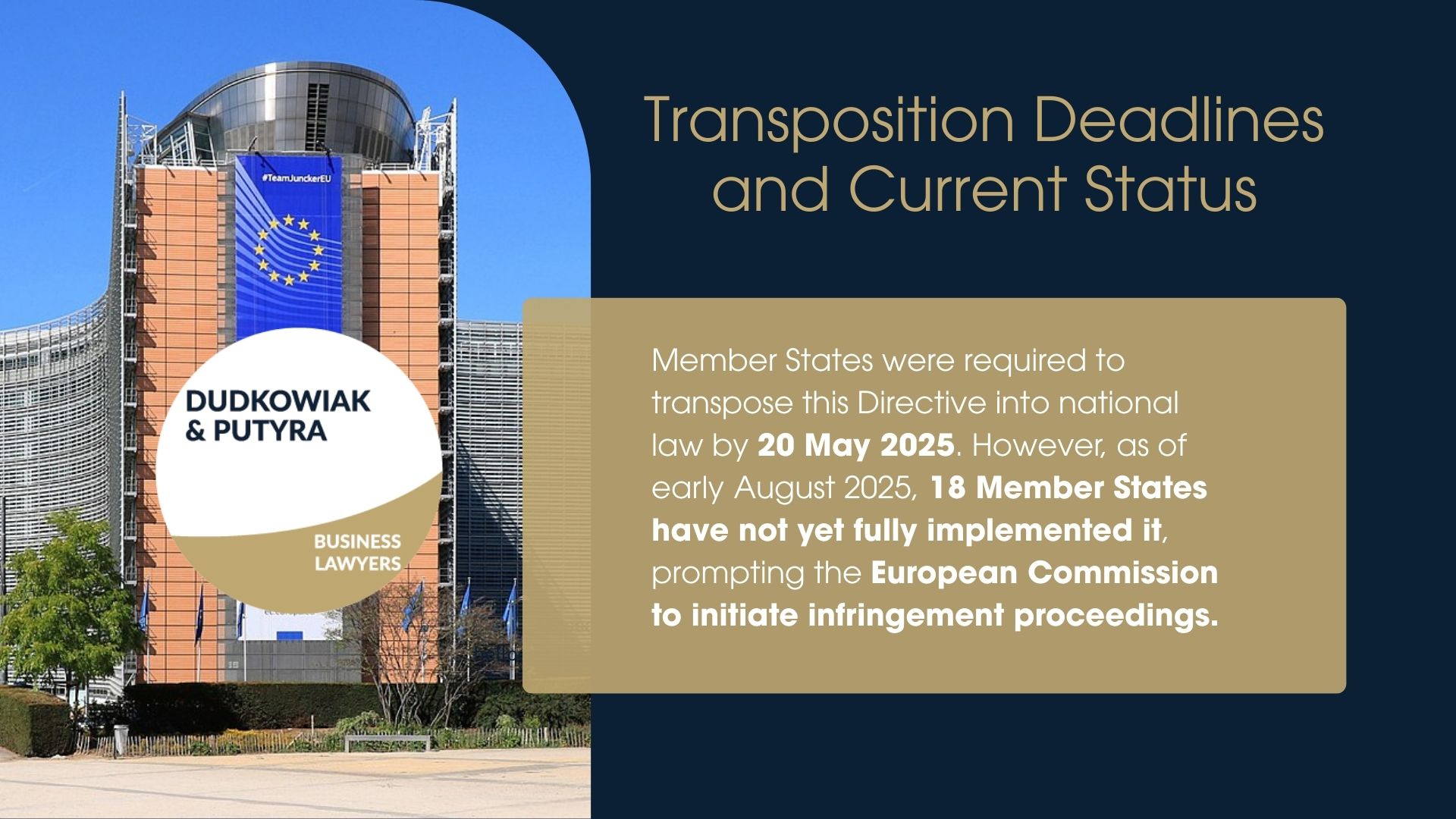
Administrative Penalties Under the AML/CFT Act of Poland (2025 Update)
The Anti-Money Laundering and Counter-Terrorism Financing Act (AML/CFT Act) of 1 March 2018, as amended in 2025, establishes a detailed system of administrative sanctions and special measures for obligated institutions that fail to comply with statutory requirements.
Types of Administrative Penalties
According to Art. 150 AML/CFT Act, penalties may include:
- Publication of violations – disclosure of the institution’s name and details of the breach in the Public Information Bulletin of the Ministry of Finance.
- Order to cease certain activities – requiring the institution to stop specific operations.
- Withdrawal of licenses or permits, or deletion from the register of regulated activities.
- Management ban – prohibition (up to 1 year) on holding managerial positions for the person responsible for the breach.
- Financial penalty – monetary fines imposed depending on the nature of the institution and the violation.
Financial Penalties
The Act sets clear thresholds for fines:
- General Rule (Art. 150(2))
- Up to twice the benefit gained or loss avoided, or
- If this amount cannot be determined, up to EUR 1,000,000.
- Specific Rules for Obligated Institutions (Art. 150(3))
- Individuals (natural persons): up to PLN 20,868,500.
- Legal persons and organizational units without legal personality:
- Up to EUR 5,000,000, or
- Up to 10% of turnover from the most recently approved financial statement,
- Or, for institutions within a capital group, from the latest consolidated financial report.
The Polish Sanctions Act: Russia and Belarus
The Polish Sanctions Act of 2022 focuses specifically on restrictive measures against Russia and Belarus. It introduces both financial and criminal liability for violations.
Financial Penalties – Fines up to PLN 20,000,000
Non-compliance can result in significant fines, including for:
- Inter alia failure to freeze funds or assets of persons/entities listed on national or EU sanctions lists,
- Breach of reporting obligations under Regulations 269/2014, 833/2014, and 765/2006,
- Violating trade prohibitions or restrictions against Russia and Belarus,
- Intentional circumventing of sanctions,
- Participation in public procurement or tenders by sanctioned persons or entities.
Criminal Liability – Imprisonment
Violations may also carry criminal penalties, including a minimum three-year prison sentence, for:
- Trade breaches under Regulations 833/2014 (Russia) and 765/2006 (Belarus),
- Violating trade bans concerning goods from the Donetsk and Luhansk regions (Regulation 2022/263),
- Importing or facilitating the import of Russian or Belarusian coal or wood products into Poland.
Exclusion From Public Procurement
Entities listed on EU or Polish sanctions lists – or companies controlled by them – are excluded from public procurement procedures and contests.
Oversight in such matters is carried out by the National Revenue Administration, in cooperation with other competent authorities.
Currently, work is underway in Poland on a draft law implementing Directive (EU) 2024/1226, which aims to harmonise liability for sanctions violations by EU Member States.
Sanctions and the Impact on Existing Contracts
How Sanctions Affect Contract Execution
When international sanctions are imposed on certain entities, sectors, or activities, they may disrupt not only new business dealings but also contracts already signed.
In many cases, sanctions can make contract performance legally or practically impossible. Under Article 495 of the Polish Civil Code, this situation is referred to as consequential impossibility not attributable to either party. In such cases:
- The obligated party is released from liability for non-performance,
- Reciprocal obligations are also extinguished,
- Any benefits already received must be reimbursed.
If only a part of a contractual obligation becomes impossible, the affected party is exempt from fulfilling that portion but remains bound by the remainder – unless partial performance has no economic value for the counterparty, in which case withdrawal from the contract is possible.
The Role of Penalty Provisions and Sanction Restrictions
Settlements may be further complicated by penalty clauses or by sanctions themselves. For example:
- Repayment under an unenforceable contract may be considered a prohibited transfer of funds to a sanctioned person,
- Recovery of services already provided could be viewed as complicity in using frozen assets, especially if the transaction involves a designated end user listed on a sanctions register.
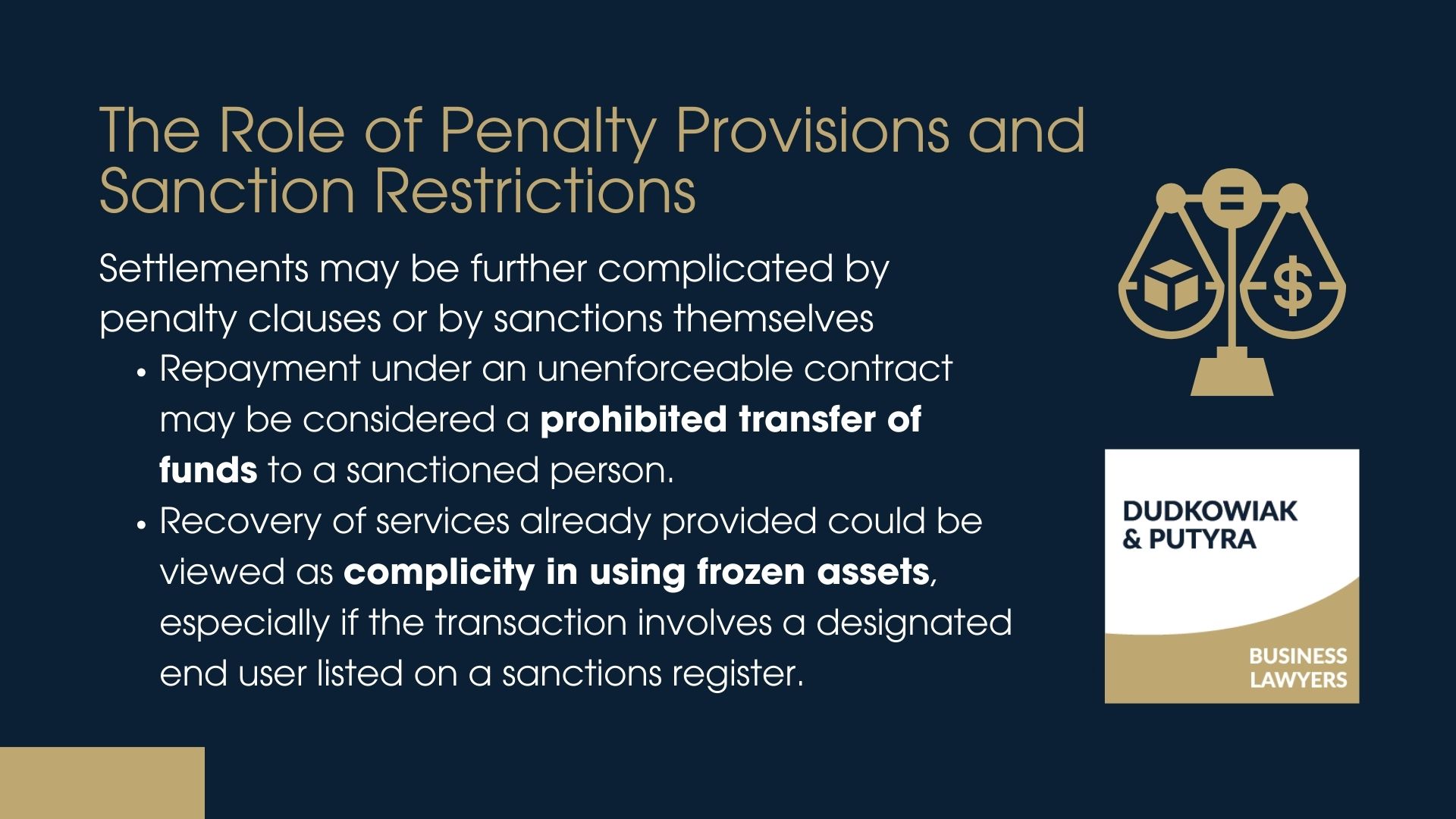
In certain circumstances, authorities may grant special consent to continue an existing contract or to authorize payment for past performance. However, such procedures are often cumbersome and uncertain, especially in jurisdictions like Poland where experience and administrative practice in this area are limited.
Onerous but Not Impossible Contracts
Sanctions may not always render performance impossible – instead, they may make execution excessively burdensome. Examples include:
- Relocating an investment due to restrictions,
- Seeking alternative (and more costly) suppliers.
When these burdens exceed the scope of normal business risk, a party may invoke Article 357¹ of the Civil Code on extraordinary change of circumstances. This allows the court to adjust contract terms or even terminate the agreement.
The distinction between impossibility of performance and excessive onerousness is crucial and may lead to different legal consequences depending on the jurisdiction and the governing law of the contract.
Force Majeure, Sanction Clauses, and Anti-Sanction Clauses
Many international contracts already contain force majeure clauses, which cover extraordinary circumstances beyond the control of the parties. Sanctions can fall into this category.
Sanction Clauses
These provisions specify how sanctions affect contract execution. They often allow for:
- Suspension of performance, or
- Termination rights if sanctions prevent fulfillment.
In essence, sanction clauses operate as specialized force majeure clauses tailored to sanctions.
Anti-Sanction Clauses
More controversial are anti-sanction clauses, which allocate sanctions risk between the parties. They may state, for example, that a party unable to perform due to sanctions remains liable for damages. These clauses must be carefully reviewed to ensure they are legally valid and not seen as attempts to circumvent applicable sanctions laws.
If a contract cannot be performed because of EU sanctions against Russia or Belarus, the contractor will not owe compensation to the sanctioned entity.
Foreign Counterparties and Conflicting Laws
Businesses must also recognize that counterparties in sanctioned countries often do not recognize foreign sanctions. In fact:
- Their domestic laws may require them to ignore sanctions, under threat of criminal prosecution,
- Their courts are unlikely to uphold foreign sanctions clauses,
- Foreign contractors refusing performance due to sanctions may face legal action in the sanctioned country.
Some states, such as Russia, may even allow their nationals affected by foreign sanctions to bring claims in local courts, regardless of pre-agreed jurisdiction or arbitration clauses.
Although the enforceability of such judgments abroad is questionable, companies with assets, employees, or operations in sanctioned countries face significant legal risks.

